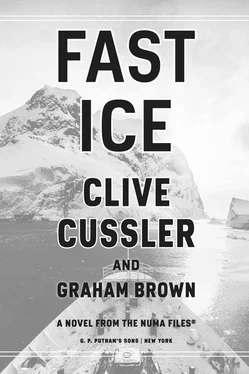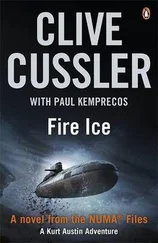Ice yachting—or hard water sailing , as some called it—was a different animal altogether. Ice yachts got their power from the wind, like a sailboat, but with almost zero drag from the sharpened blades they traveled on. They could hit triple-digit speeds, in the right hands. With the Potomac frozen solid, and a ten-day vacation on the books, Kurt had been practicing daily, getting tantalizingly close to that elusive number.
“Ninety-one,” Joe told him. “One mile to go.”
Kurt guided the tiller lightly as the yacht ran straight and true. The polished black ice stretched out in front of him like a sheet of tinted glass, the snow-covered banks of the Potomac racing by in a blur caught only by his peripheral vision.
“Ninety-five,” Joe said . “Ninety-six.”
Kurt sensed a tiny vibration through his fingertips. A buzzing that shouldn’t have been there. It ran through the frame of the craft and up through the tiller.
“Ninety-seven,” Joe told him.
Kurt heard Joe, but he wasn’t really listening. The vibration had grown rapidly worse and the sense of impending disaster had grown with it. The tiller began shaking violently. One of the runners had come loose.
Kurt spilled the wind from the sail, trying to slow down.
“Ninety-eight,” Joe said. “Kurt, you—”
There was a sharp crack as the outboard runner broke free. The right side of the hull dropped to the ice, pulling the ice yacht to the right. The nose runner dug in and snapped off, taking part of the hull with it. Sharp shards of fiberglass flew up from the nose. One piece whipped past Kurt’s head, another ripped the sail.
The rest of the crash was incomprehensible chaos. The yacht spun and slid and then caught an edge, which sent it tumbling uncontrollably. The carbon fiber mast snapped, the outrigger pontoon folded underneath Kurt and the sail draped him and what was left of the machine.
The yacht slid another hundred feet before crashing into the snowy bank of the river, rebounding off it and coming to a stop in an unrecognizable heap of fiberglass and canvas.
Kurt found himself trapped inside of what remained of the cockpit, aggravated with himself for pushing so hard but thankful for the helmet and five-point harness he wore.
Pushing some of the debris aside, Kurt sat up. He pulled off his helmet, catching sight of his own reflection, distorted and dark, in the ice. An unruly mane of silver hair covered his head. His coral blue eyes looked brown in the reflection, and the furrows in his brow made him look older than his thirty-eight years. A lifetime spent in the elements had seen to that. Not to mention a few crashes long before this one.
Putting the helmet down, he reached for the quick release on the safety harness, unbuckled it and slid out from what remained of the seat. As he pulled himself clear, he spotted Joe running toward him across the ice.
Joe had a radio in one hand and the radar gun in the other. He ran carefully, dashing several yards and then sliding along for several more in a controlled skid. He came to a stop a few feet from Kurt. “You all right?”
“I will be,” Kurt said, “if you tell me we reached a hundred before the wipeout.”
Joe looked at the radar gun and shook his head. “Sorry, amigo. You topped out at ninety-eight. Maybe this thing is broken.”
Kurt got to his feet, metal studs on his boots giving him grip. He looked back at the yacht. “Something tells me that’s the only thing not broken around here. Hope you were serious about that insurance.”
The ice yacht was demolished, it would take weeks to repair. It might have been quicker to build a new one from scratch. Either way, the Potomac would be thawed by then and back under the control of the soft water sailors.
Before Joe could respond, his phone began to buzz. He put the radar gun down and pulled the phone from the inner pocket of his coat. “Zavala here.”
Even though the phone wasn’t on speaker mode, the person on the other end spoke loud enough for Kurt to hear clearly. He recognized the voice as that of Rudi Gunn, the number two man at the National Underwater and Marine Agency, where Kurt and Joe both worked.
NUMA was a U.S. government agency tasked with a wide range of nautical affairs, everything from studying ocean currents and sea life to the raising and salvaging of sunken ships, especially those of historical or strategic value.
Rudi Gunn was a logistical and operational expert. He handled most of the day-to-day affairs. He was also Kurt’s and Joe’s direct superior.
As Rudi spoke, Kurt waved his hands back and forth, giving Joe the international I’m not here signal .
Joe ignored him. “Actually, he’s standing right next to me,” Joe said, then added, “I have no idea why he’d be ignoring your calls. Probably a personality defect or a pathological disregard for authority figures . . . Yes, I think he likes his job at NUMA quite a bit—”
“Give me that phone,” Kurt said.
Joe grinned as he handed it over.
Kurt put the phone to his ear. “Afternoon, Rudi. What can I do for you?”
“For starters,” Rudi said, “you can answer when I call. Or at least respond to one of the seven messages I left.”
Rudi sounded hot under the collar, a rare occurrence for one of the calmest men Kurt knew.
With his free hand, Kurt patted down the pockets of his jacket. “Seem to have misplaced my phone,” he said. He glanced over at the wreckage. “I must have left it in the yacht.”
“Yacht?” Rudi said. “We’re obviously paying you too much.”
Kurt laughed. “It’s a bit of a fixer-upper, at this point. I assume you called seven times for a reason?”
Rudi shifted gears instantly. “I need you and Joe to come into the office. I have a mission I’d like you to tackle personally.”
Kurt was NUMA’s Director of Special Projects. The position acted as a catchall for anything out of the ordinary that might come NUMA’s way. It often meant flying off to distant parts of the world at a moment’s notice. And just as often involved high stakes scenarios of one type or another.
Based on Rudi’s tone, it sounded like one of those scenarios was unfolding. “We’ll be there in fifteen minutes.”
Rudi acknowledged that time frame and hung up. Kurt handed Joe his phone.
“Let me guess,” Joe said. “Winter break is over.”
Kurt nodded, stretching and twisting until he felt three of his vertebrae pop mercifully back into their correct position. “And not a moment too soon. We’re liable to hurt ourselves out here.”
4
NUMA HEADQUARTERS BUILDING
WASHINGTON, D.C.
After dragging the wrecked ice yacht onto the bank—and leaving a note promising they’d be back to clean up the mess—Kurt and Joe hiked along the frozen river until they stood below the NUMA headquarters building, which overlooked the Potomac.
Climbing the riverbank and crossing the street, they entered the building and took the elevator to the seventh floor. The hallway was warm and filled with the aroma of cinnamon, as someone on the weekend staff had made hot chocolate with a liberal dosing of the spice.
Joe inhaled deeply. “If I’d known it could smell this good in here, I’d gladly come in on my day off.”
“This is our day off,” Kurt reminded him.
“Was,” Joe replied.
Passing several empty offices, including one with Christmas lights still twinkling on a small tree, they reached a well-lit conference room. Rudi Gunn waited inside.
Rudi was a trim man, short in stature, but fit and stern. He stood ramrod straight, staring at them, before glancing at his watch. “Sixteen minutes and forty-three seconds,” he said. “You’re late.”
Читать дальше












